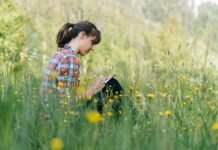
Ahhh… the crisp air and vast white of the alps—now that’s an office with a view!
Some professions are lucky enough to boast such lofty vistas, these are typically work with nature occupations (i.e. park ranger, wildlife guide, nature photographer).
But what about the rest of us deskbound servants?
We can take our lunch break in the park, walk or ride to work, maybe even cultivate an urban garden to gaze upon. The reasons for doing this go beyond improved productivity—nature helps ground us in the moment, it counters ‘stimulus overload’ by engaging focus in the restorative pace of nature. These scientifically established benefits of nature have inspired a novel campaign by the Nature Conservancy.
In the lead-up to The Nature Conservancy (TNC) Australia’s second-annual Work with Nature Week, Deakin University’s Health, Nature and Sustainability Research Group’s associate researcher, Dr Rona Weerasuriya, explores the benefits of increasing human contact with nature and the outdoors.
A combination of ancient wisdom, evidence-based research and health promotion initiatives have indicated that people connect best with places they have positive and rewarding experiences in.
The positive benefits of increasing our connection and contact with nature are ten-fold. Research suggests that spending time outdoors passively alone or with others, and participating in outdoor therapy or adventure programs such as bush walking and wilderness therapy, all have a positive impact and provide vital benefits to our health and wellbeing.
Nowadays even your local GP can prescribe a ‘green prescription’, where they literally recommend people simply spend more time in nature to aid recovery and ease pain from various mental, emotional and physical ailments.
Schools instill programs to incorporate activities such as camping, bush walking and kitchen gardens, so our children also grow up with an appreciation of and attachment to nature, and begin to understand and acknowledge its importance.
There are countless conservation initiatives that promote volunteer work outdoors – also included The Nature Conservancy Australia’s Work with Nature Week, which sees countless Australians commit to spending an hour outdoors during the working week.
The above initiatives have been shown to promote attachment to nature through the positive experiences and sense of well-being generated through participation. As such, they could be identified as methods to restore human relations with nature.
Leaving aside ancient knowledge, which indicates acknowledgement of human’s deep-seated relationship and mutual benefits enjoyed with nature, there is a growing evidence base of the benefits to humans from viewing or having more direct contact with nature. Nature in this context constitutes both flora and fauna.
Among the health and wellbeing benefits documented include…
An ability to connect with people, in a less formal and more relaxed setting conducive to socialisation.
Opportunities for rest, relaxation and rejuvenation through escaping away from a setting, which demands directed attention, to one which calls upon undirected, involuntary attention and thereby allows the viewer to be softly fascinated and immersed in the surrounding environment.
Opportunities for physical activity in people of all ages in relaxing settings, which provide stimulation to the senses.
Opportunities which give rise to hope and a sense of acceptance through viewing regeneration in nature.
Opportunities to experience sensory stimulation through exposure to certain scents and colours, which induce a sense of calm, and soothes and uplifts people providing emotional support and strength they require to face a challenging situation.
Opportunities to reminisce in nature, especially of positive memories from the past, spent with loved ones in similar settings. This again provides a therapeutic avenue to reach out to elements that are comforting and uplifting.
Opportunities to explore, be intrigued and make new discoveries which are enjoyable and stimulating to the senses.
At other times, such as when participating in outdoor/wilderness therapy and bush walks, people are challenged, and discovered their own strengths and resilience.
The innate connections humans are known to share with the natural world make outdoor spaces feel more welcoming, relaxing and comforting to spend time in.
Additionally, people appear to experience and draw spiritual strength from being in the outdoors. For example, people have reported describing green spaces as ‘a space akin to a non-denominational church’, and as a space which is ‘good for the soul’, ‘a safe haven’ and feeling ‘blessed during access to such settings.
For many of the same reasons described above, nature is also identified as a source of distraction from negative thoughts, conducive to alleviating negative affective states (via the same mechanisms described above).
Given the clear benefits of spending time in nature, The Nature Conservancy (TNC) Australia is again encouraging Aussies to swap their desks for the great outdoors by working outside for an hour during Work with Nature Week running March 20 – 26, 2017.
Work with Nature Week aims to inspire Australians to appreciate the environment by pledging to work outside in their nearest park, green space or outdoor area—at their very own ‘greendesk’.
For those who can’t make it outdoors, greendesks will appear across Melbourne in March—paired with green screens, allowing people to take a picture of themselves working outdoors in front of iconic Australian environments.
Be it working among Australia’s beautiful beaches, the banks of the Murray-Darling or even the stunning Western desert—people are encouraged to post these photos to Instagram and hash tag #greendesk for a chance to win a $1,000 travel voucher.

How to get involved in TNC’s Work with Nature Week
Select your outdoor space and visit workwithnature.org.au to register your #greendesk.
Work from your #greendesk for at least one hour between March 20 – 26, 2017, to reap the benefits of an outdoor office.
Upload your #greendesk to Instagram or take a picture with one of TNC’s roving green screens and tag @nature_aus. Throughout March, share your photo using #greendesk and #workwithnature for your chance to win a $1,000 travel voucher.
Dr Rona Weerasuriya is an associate researcher with Deakin University’s Health, Nature and Sustainability Research Group and a Fellow of the Royal Society for Public Health. Her research interests focus on investigating the benefits of contacts with nature for human health and wellbeing. Her PhD research which was conducted across three hospital campuses in metropolitan Melbourne explored user experiences accessing gardens within health care settings. Current research undertaken includes the evaluation of user experiences of a children’s garden in a healthcare setting. She is the co- author of Beyond Blue to Green: the benefits of contact with nature for mental health and well-being.
The Nature Conservancy is a global conservation organisation dedicated to conserving the lands and waters on which all life depends. Working in more than 65 countries, applying a collaborative approach that engages local communities, governments, the private sector, and other partners.
















